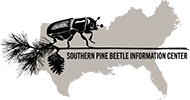Abstract
Development time and observed mortality of Dendroctonus frontalis Zirnrn. in relation to changes in host-tree condition were studied in east Texas during the summer of 1977. Four indices of host condition were monitored: bark, phloem, and xylem moisture and twig xylem water potential. Successful attack initiated predictable patterns of drying and rehydration in the phloem and xylem, and increasingly negative water potentials at the branch tips. These patterns were described mathematically and correlated to beetle development time. Eggs and 1st stage larvae were not affected by changes in phloem moisture in individual trees. However, development of 2nd- and 3rd-stage larvae was slowed when phloem moisture stayed above ca. 170% oven dry weight prior to those stages. Development of 2nd- and 3rd-stage larvae was also slowed in trees exhibiting large decreases in phloem moisture during those stages. Larval mortality was greater than mortality to other life stages. Concurrently, changes in phloem moisture were greatest when larvae were developing. Bark moisture remained at ca. 30% oven dry weight throughout beetle development. Development of 4th stage larvae and pupae was slower in trees with high average bark moisture during those stages.
